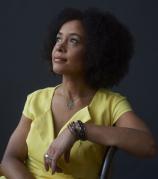Diana Evans
Biography
Diana Evans
Diana Evans is a British author of Nigerian and English descent. Her bestselling debut novel, 26a, won the inaugural Orange Award for New Writers and the British Book Awards deciBel Writer of the Year prize. It was shortlisted for the Whitbread First Novel, the Guardian First Book, the Commonwealth Best First Book and the Times/Southbank Show Breakthrough awards, and longlisted for the International IMPAC Dublin Literary Award.
Her second novel, THE WONDER, was also published to critical acclaim and is under option for TV dramatisation. Evans was nominated for the Andrew Carnegie Medals for Excellence in Fiction for her third novel, ORDINARY PEOPLE, which was a New Yorker, New Statesman and Financial Times book of the year, was shortlisted for the Women’s Prize for Fiction, the Rathbones Folio Prize and the Orwell Prize for Political Fiction, and won the South Bank Sky Arts Award for Literature.
She is a former dancer, and as a journalist and critic has contributed to among others Time Magazine, Marie Claire, The Independent, The Guardian, The Observer, The Times, The New York Review of Books and Harper’s Bazaar. An associate lecturer in Creative Writing at Goldsmiths, University of London, she holds an MA in Creative Writing from the University of East Anglia and was a Royal Literary Fellow at the London College of Fashion and the University of Kent. She lives in London.
Diana Evans




